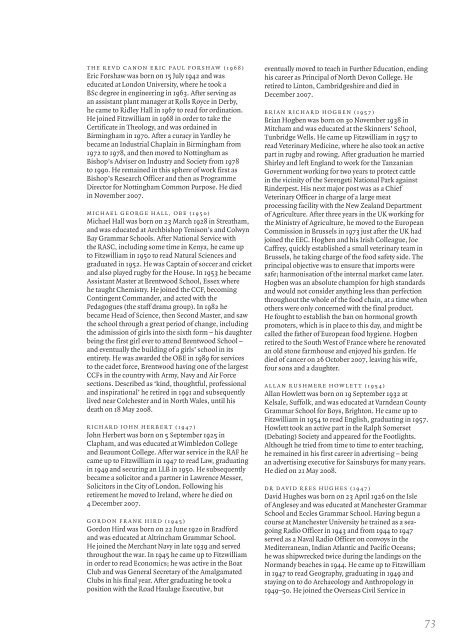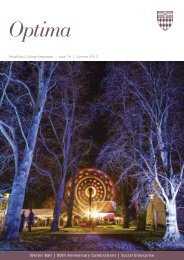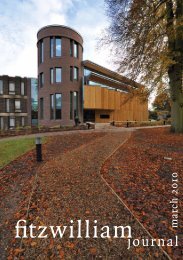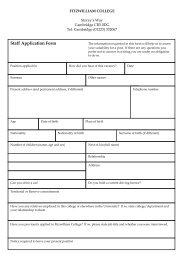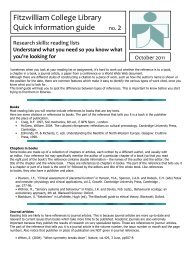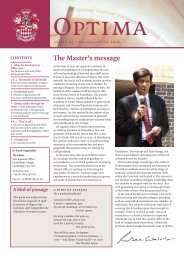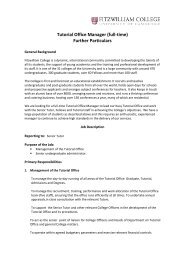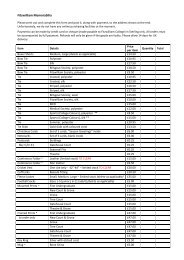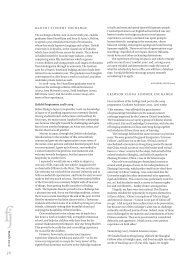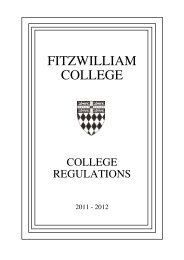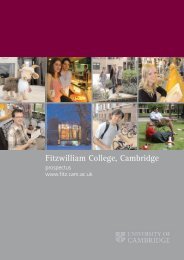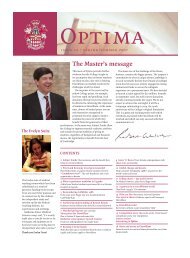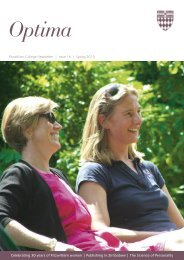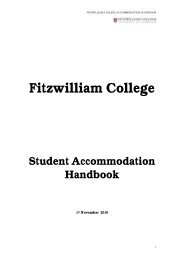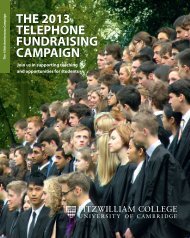march 2009 - Fitzwilliam College - University of Cambridge
march 2009 - Fitzwilliam College - University of Cambridge
march 2009 - Fitzwilliam College - University of Cambridge
You also want an ePaper? Increase the reach of your titles
YUMPU automatically turns print PDFs into web optimized ePapers that Google loves.
THE REVD CANON ERIC PAUL FORSHAW (1968)<br />
Eric Forshaw was born on 15 July 1942 and was<br />
educated at London <strong>University</strong>, where he took a<br />
BSc degree in engineering in 1963. After serving as<br />
an assistant plant manager at Rolls Royce in Derby,<br />
he came to Ridley Hall in 1967 to read for ordination.<br />
He joined <strong>Fitzwilliam</strong> in 1968 in order to take the<br />
Certificate in Theology, and was ordained in<br />
Birmingham in 1970. After a curacy in Yardley he<br />
became an Industrial Chaplain in Birmingham from<br />
1972 to 1978, and then moved to Nottingham as<br />
Bishop’s Adviser on Industry and Society from 1978<br />
to 1990. He remained in this sphere <strong>of</strong> work first as<br />
Bishop’s Research Officer and then as Programme<br />
Director for Nottingham Common Purpose. He died<br />
in November 2007.<br />
MICHAEL GEORGE HALL, OBE (1950)<br />
Michael Hall was born on 23 March 1928 in Streatham,<br />
and was educated at Archbishop Tenison’s and Colwyn<br />
Bay Grammar Schools. After National Service with<br />
the RASC, including some time in Kenya, he came up<br />
to <strong>Fitzwilliam</strong> in 1950 to read Natural Sciences and<br />
graduated in 1952. He was Captain <strong>of</strong> soccer and cricket<br />
and also played rugby for the House. In 1953 he became<br />
Assistant Master at Brentwood School, Essex where<br />
he taught Chemistry. He joined the CCF, becoming<br />
Contingent Commander, and acted with the<br />
Pedagogues (the staff drama group). In 1982 he<br />
became Head <strong>of</strong> Science, then Second Master, and saw<br />
the school through a great period <strong>of</strong> change, including<br />
the admission <strong>of</strong> girls into the sixth form – his daughter<br />
being the first girl ever to attend Brentwood School –<br />
and eventually the building <strong>of</strong> a girls’ school in its<br />
entirety. He was awarded the OBE in 1989 for services<br />
to the cadet force, Brentwood having one <strong>of</strong> the largest<br />
CCFs in the country with Army, Navy and Air Force<br />
sections. Described as ‘kind, thoughtful, pr<strong>of</strong>essional<br />
and inspirational’ he retired in 1991 and subsequently<br />
lived near Colchester and in North Wales, until his<br />
death on 18 May 2008.<br />
RICHARD JOHN HERBERT (1947)<br />
John Herbert was born on 5 September 1925 in<br />
Clapham, and was educated at Wimbledon <strong>College</strong><br />
and Beaumont <strong>College</strong>. After war service in the RAF he<br />
came up to <strong>Fitzwilliam</strong> in 1947 to read Law, graduating<br />
in 1949 and securing an LLB in 1950. He subsequently<br />
became a solicitor and a partner in Lawrence Messer,<br />
Solicitors in the City <strong>of</strong> London. Following his<br />
retirement he moved to Ireland, where he died on<br />
4 December 2007.<br />
GORDON FRANK HIRD (1945)<br />
Gordon Hird was born on 22 June 1920 in Bradford<br />
and was educated at Altrincham Grammar School.<br />
He joined the Merchant Navy in late 1939 and served<br />
throughout the war. In 1945 he came up to <strong>Fitzwilliam</strong><br />
in order to read Economics; he was active in the Boat<br />
Club and was General Secretary <strong>of</strong> the Amalgamated<br />
Clubs in his final year. After graduating he took a<br />
position with the Road Haulage Executive, but<br />
eventually moved to teach in Further Education, ending<br />
his career as Principal <strong>of</strong> North Devon <strong>College</strong>. He<br />
retired to Linton, <strong>Cambridge</strong>shire and died in<br />
December 2007.<br />
BRIAN RICHARD HOGBEN (1957)<br />
Brian Hogben was born on 30 November 1938 in<br />
Mitcham and was educated at the Skinners’ School,<br />
Tunbridge Wells. He came up <strong>Fitzwilliam</strong> in 1957 to<br />
read Veterinary Medicine, where he also took an active<br />
part in rugby and rowing. After graduation he married<br />
Shirley and left England to work for the Tanzanian<br />
Government working for two years to protect cattle<br />
in the vicinity <strong>of</strong> the Serengeti National Park against<br />
Rinderpest. His next major post was as a Chief<br />
Veterinary Officer in charge <strong>of</strong> a large meat<br />
processing facility with the New Zealand Department<br />
<strong>of</strong> Agriculture. After three years in the UK working for<br />
the Ministry <strong>of</strong> Agriculture, he moved to the European<br />
Commission in Brussels in 1973 just after the UK had<br />
joined the EEC. Hogben and his Irish Colleague, Joe<br />
Caffrey, quickly established a small veterinary team in<br />
Brussels, he taking charge <strong>of</strong> the food safety side. The<br />
principal objective was to ensure that imports were<br />
safe; harmonisation <strong>of</strong> the internal market came later.<br />
Hogben was an absolute champion for high standards<br />
and would not consider anything less than perfection<br />
throughout the whole <strong>of</strong> the food chain, at a time when<br />
others were only concerned with the final product.<br />
He fought to establish the ban on hormonal growth<br />
promoters, which is in place to this day, and might be<br />
called the father <strong>of</strong> European food hygiene. Hogben<br />
retired to the South West <strong>of</strong> France where he renovated<br />
an old stone farmhouse and enjoyed his garden. He<br />
died <strong>of</strong> cancer on 26 October 2007, leaving his wife,<br />
four sons and a daughter.<br />
ALLAN RUSHMERE HOWLETT (1954)<br />
Allan Howlett was born on 19 September 1932 at<br />
Kelsale, Suffolk, and was educated at Varndean County<br />
Grammar School for Boys, Brighton. He came up to<br />
<strong>Fitzwilliam</strong> in 1954 to read English, graduating in 1957.<br />
Howlett took an active part in the Ralph Somerset<br />
(Debating) Society and appeared for the Footlights.<br />
Although he tried from time to time to enter teaching,<br />
he remained in his first career in advertising – being<br />
an advertising executive for Sainsburys for many years.<br />
He died on 21 May 2008.<br />
DR DAVID REES HUGHES (1947)<br />
David Hughes was born on 23 April 1926 on the Isle<br />
<strong>of</strong> Anglesey and was educated at Manchester Grammar<br />
School and Eccles Grammar School. Having begun a<br />
course at Manchester <strong>University</strong> he trained as a seagoing<br />
Radio Officer in 1943 and from 1944 to 1947<br />
served as a Naval Radio Officer on convoys in the<br />
Mediterranean, Indian Atlantic and Pacific Oceans;<br />
he was shipwrecked twice during the landings on the<br />
Normandy beaches in 1944. He came up to <strong>Fitzwilliam</strong><br />
in 1947 to read Geography, graduating in 1949 and<br />
staying on to do Archaeology and Anthropology in<br />
1949–50. He joined the Overseas Civil Service in<br />
73


